高中英语语法否定转移课件(共32张PPT)
文档属性
| 名称 | 高中英语语法否定转移课件(共32张PPT) |  | |
| 格式 | ppt | ||
| 文件大小 | 559.0KB | ||
| 资源类型 | 教案 | ||
| 版本资源 | 通用版 | ||
| 科目 | 英语 | ||
| 更新时间 | 2022-03-10 15:16:58 | ||
图片预览

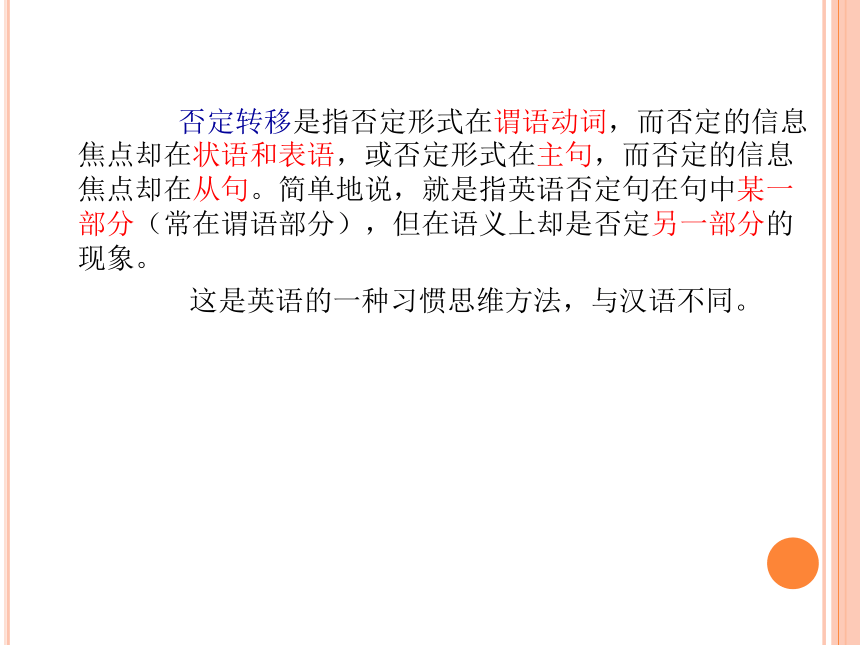
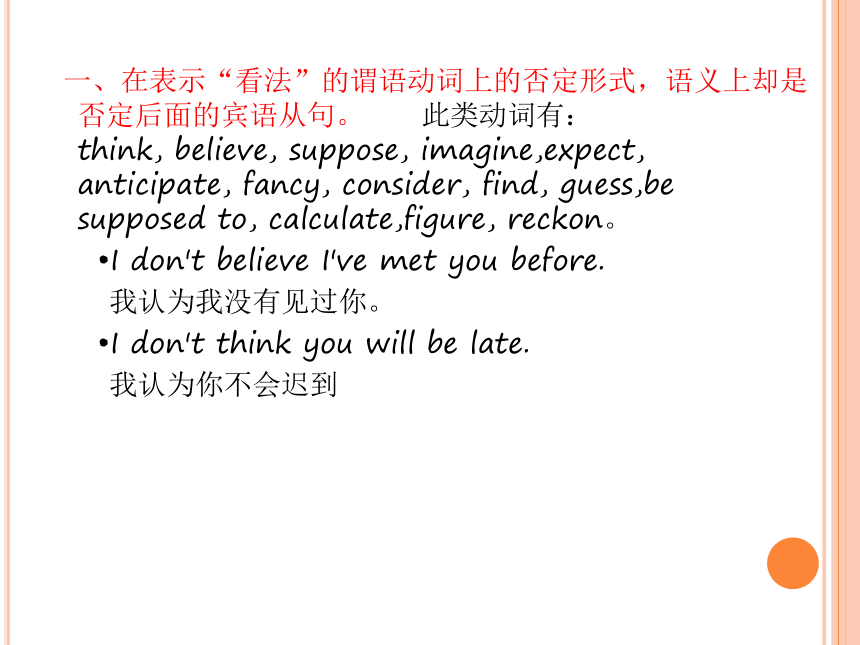


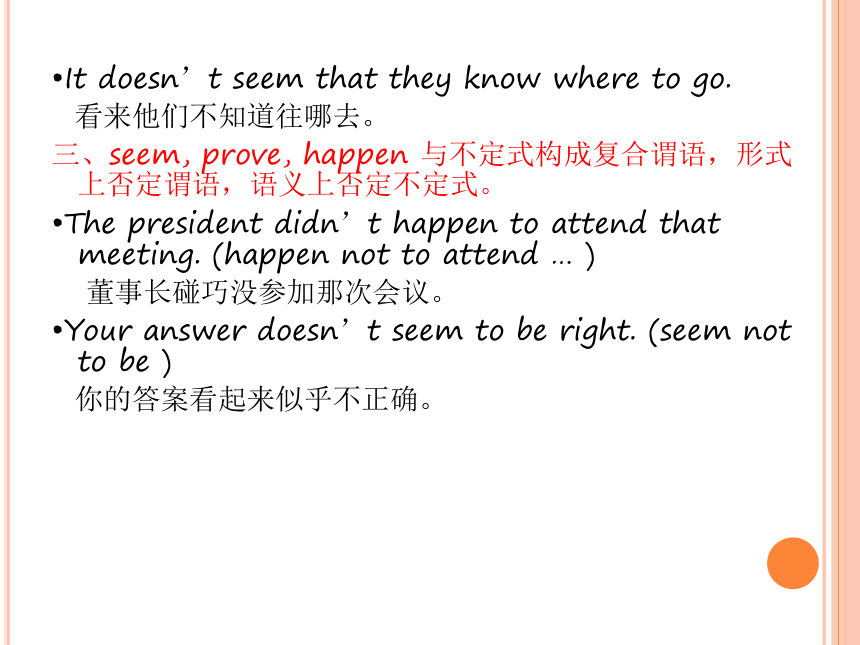
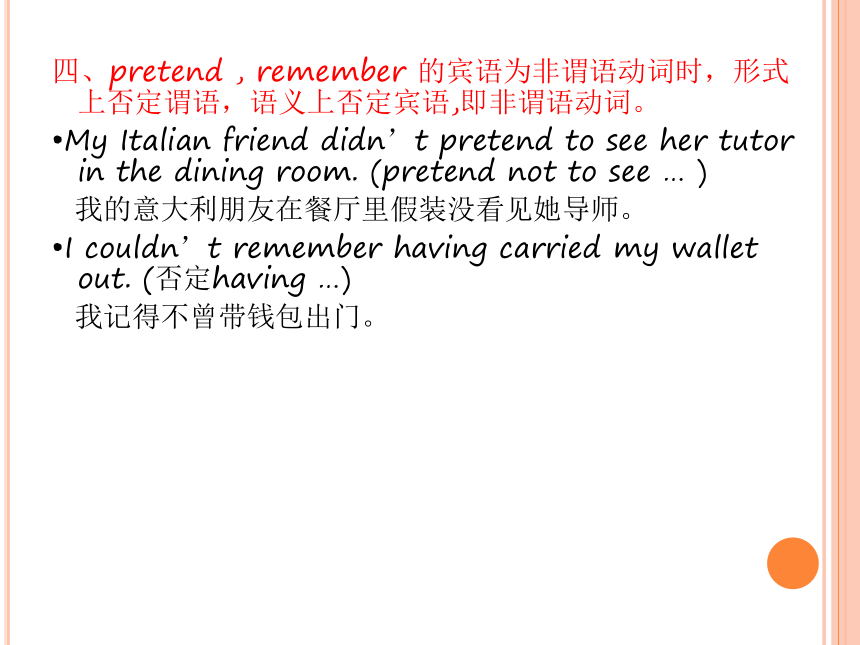
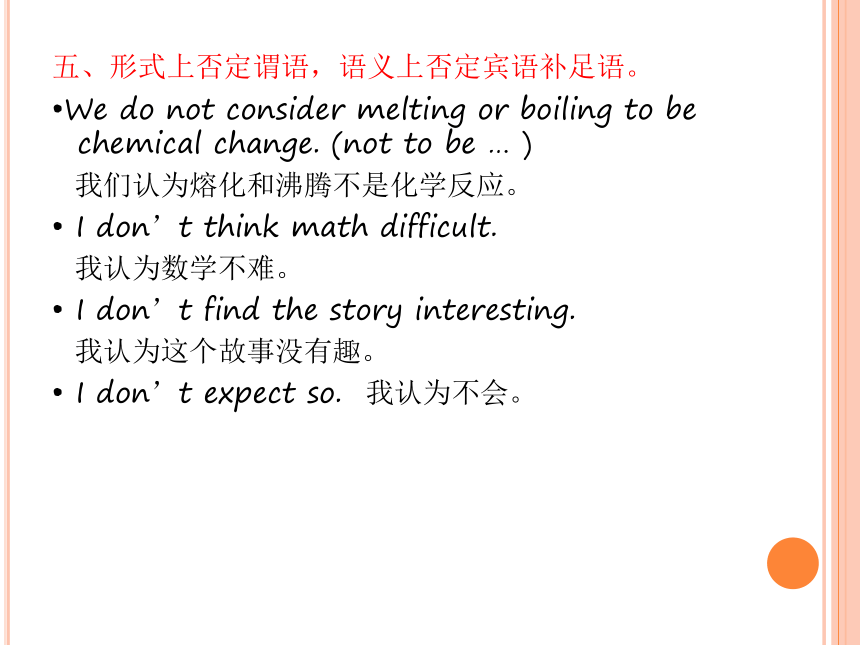
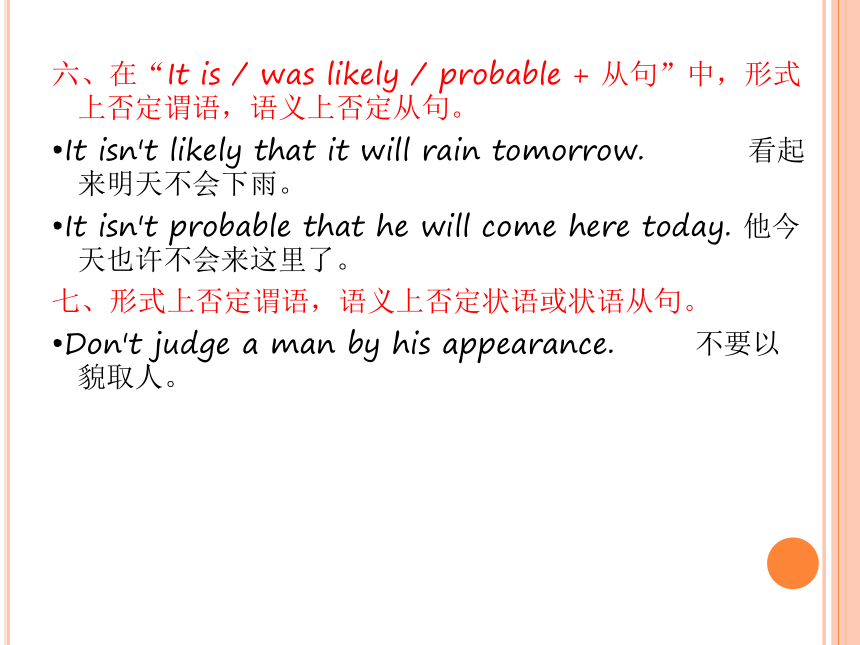

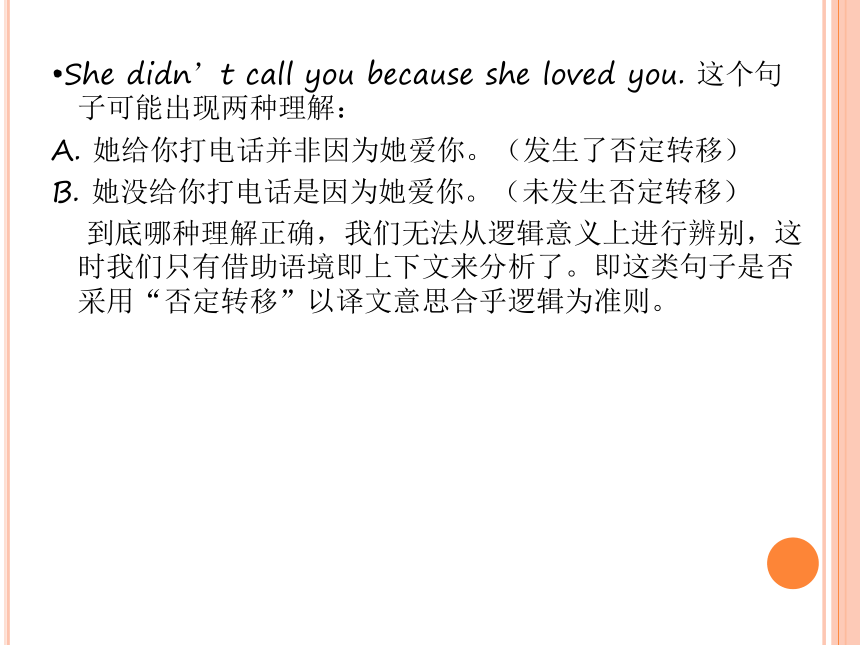
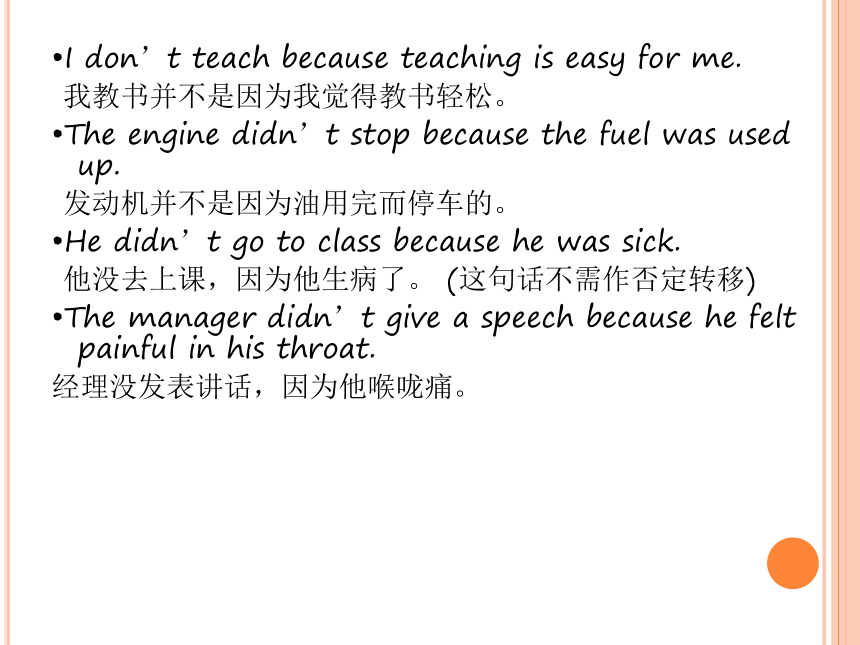
文档简介
(共32张PPT)
否定转移
否定转移是指否定形式在谓语动词,而否定的信息焦点却在状语和表语,或否定形式在主句,而否定的信息焦点却在从句。简单地说,就是指英语否定句在句中某一部分(常在谓语部分),但在语义上却是否定另一部分的现象。
这是英语的一种习惯思维方法,与汉语不同。
一、在表示“看法”的谓语动词上的否定形式,语义上却是否定后面的宾语从句。 此类动词有: think, believe, suppose, imagine,expect, anticipate, fancy, consider, find, guess,be supposed to, calculate,figure, reckon。
I don't believe I've met you before.
我认为我没有见过你。
I don't think you will be late.
我认为你不会迟到
上述表示“看法”或“判断”的动词出现以下情况时,其否定不发生转移:
九种情况不转移
二、在表示“感觉”的谓语动词上的否定形式,语义上却否定表语部分。
此类动词有:
appear, seem, feel, sound, taste, smell, as if,feel , look ,feel like,look like.
I’m not feeling very well today. My head aches. ( not very well … )
我今天感到不怎么舒服,头痛。
The food doesn’t taste fresh. ( not fresh . ) 食物尝起来不鲜。
It doesn’t seem that they know where to go.
看来他们不知道往哪去。
三、seem, prove, happen 与不定式构成复合谓语,形式上否定谓语,语义上否定不定式。
The president didn’t happen to attend that meeting. (happen not to attend … )
董事长碰巧没参加那次会议。
Your answer doesn’t seem to be right. (seem not to be )
你的答案看起来似乎不正确。
四、pretend , remember 的宾语为非谓语动词时,形式上否定谓语,语义上否定宾语,即非谓语动词。
My Italian friend didn’t pretend to see her tutor in the dining room. (pretend not to see … )
我的意大利朋友在餐厅里假装没看见她导师。
I couldn’t remember having carried my wallet out. (否定having …)
我记得不曾带钱包出门。
五、形式上否定谓语,语义上否定宾语补足语。
We do not consider melting or boiling to be chemical change. (not to be … )
我们认为熔化和沸腾不是化学反应。
I don’t think math difficult.
我认为数学不难。
I don’t find the story interesting.
我认为这个故事没有趣。
I don’t expect so. 我认为不会。
六、在“It is / was likely / probable + 从句”中,形式上否定谓语,语义上否定从句。
It isn't likely that it will rain tomorrow. 看起来明天不会下雨。
It isn't probable that he will come here today. 他今天也许不会来这里了。
七、形式上否定谓语,语义上否定状语或状语从句。
Don't judge a man by his appearance. 不要以貌取人。
Don’t read in the sun. 不要在阳光下看书。
Let’s not talk about it here. 我们别在这里谈吧。
Don’t talk with your mouth full of food. 不要口里含着食物说话。
注:含有not … because (of) 的句子,情况较复杂,需根据逻辑、语境和常识进行判断是否需要作否定转移,如需转移的话,往往是由否定谓语转为否定状语。
She didn’t call you because she loved you. 这个句子可能出现两种理解:
A. 她给你打电话并非因为她爱你。(发生了否定转移)
B. 她没给你打电话是因为她爱你。(未发生否定转移)
到底哪种理解正确,我们无法从逻辑意义上进行辨别,这时我们只有借助语境即上下文来分析了。即这类句子是否采用“否定转移”以译文意思合乎逻辑为准则。
I don’t teach because teaching is easy for me.
我教书并不是因为我觉得教书轻松。
The engine didn’t stop because the fuel was used up.
发动机并不是因为油用完而停车的。
He didn’t go to class because he was sick.
他没去上课,因为他生病了。 (这句话不需作否定转移)
The manager didn’t give a speech because he felt painful in his throat.
经理没发表讲话,因为他喉咙痛。
八、表示信念、看法、愿望的名词充当主语从句的表语时,形式上否定谓语,语义上否定主语从句。这类词有:hope, thought, view, opinion, wish, expectation, belief, plan 等。
It is not our expectation that you will suffer a lot from that. (will not suffer … )
我们希望你不要为那事受太多苦。
It is not my opinion that you spend much time on computer games. (do not spend … )
我的看法是你不要花太多时间玩电脑游戏。
It is not their plan that their homework is done on Sunday.
他们计划星期天不做家庭作业。
九、 ★ 含有全体意义的代词和副词作主语或宾语时,形式上否定谓语,语义上否定主语或宾语,表示部分否定。这类词有:
all, both, every, everybody, everything, everywhere, always, altogether, entirely,wholly。
I don’t like both of them. (not both of them.) 这两本小说,我不是都喜欢。
All the people didn't know the truth. (Not all the people knew the truth.)
并非所有的人都知道事情的真相。
Everybody, it is true, wouldn’t like it. ( Not everybody …)
的确不是人人都喜欢它。
I don’t know all of them. (not all of them)
对于他们我不是个个都认识的。
注:当all 与can not 或 won’t 构成否定句式时,其否定不再发生转移,而表示全部否定。
All the foreigners can not pass the borders without visas.
所有外国人没有签证均不能过境。
All the treatment won’t make any help for her disease.
所有的治疗对他的疾病都无用。
always的否定式:
"并非总是(并非一直)……"
He is not always so sad.
他并不是一直都这样悲伤。
entirely, altogether, completely 和quite 的否定式:"不完全……","并非完全……"
(1)The businessman is never to be entirely trusted.
不可以完全信任商人。
(2)He felt not altogether satisfied.
他并不完全满意。
(3)I don’t agree completely.
我并不完全同意。
(4)What he did was not quite proper.
他做的不十分妥当。
all the time 的否定式:
"并非一直……"、"未必老是……"
A foolish man doesn't make a mistake all the time.
笨人未必老是犯错误。
not…and…的否定式,被否定的
往往是and后面的那一部分。
(1)He did not speak clearly and correctly.
他讲得清楚但不正确。
(2)This film is not interesting and instructive.
这部电影有趣但无教育意义。
注意:如果将and 换成or,not 对其后 面的两部分就全盘否定了。
He did not speak clearly or correctly.
他讲的既不清楚也不正确。
全部否定:
如果要对前面的all, both, every, always,以及entirely, altogether, completely, quite 和 all the time 等词作完全否定,那就分别要用与之相对应的全否定词:
如no, none, neither, no one, never, not (never)… at all 等。
构成全部否定的单词和词组有:
never(决不,从来不),no(没有,不),
not(不,不是),none(没人,谁都不,没有任何东西),
nobody(没人),nothing(什么也没有,没有任何事情),
nowhere(没有什么地方),neither(两者都不),
nor(也没有,也不),not at all (一点也不)。
翻译
(1)The ant is not gathering this for itself alone.
(否定状语)蚂蚁不只是为自己采食。
(2)He was not ready to believe something
just because Aristotle said so.
(否定because状语) 他并不因亚里斯多德
说过如何如何,就轻信此事。
(3)She had not been married many weeks
when that man's younger brother saw her
and was struck by her beauty.
(否定状语many weeks)她结婚还不到几个月,
这个人的弟弟就看见她了,并对她的美貌着了迷。
(4)It's not a place where anyone would expect to
see strange characters on the street. 在这里,人们不会想到在街上会碰上陌生的人。
(anyone 作主语,从句中的谓语动词
不能用否定形式。)
翻译
All is not gold that glitters.
(=Not all that glitters is gold.)
发光的并不都是金子。
Such books cannot be found everywhere.
(=Not everywhere can such books be found.)
这种书并不到处都能找到的。
I didn’t go there just to ask for help.
(=I went there not just to ask for help.)
我去那儿不只是为了求援。
exercise
1)I don’t feel that my present way of life really fulfils me.
我觉得我现在的生活方式并不能真正让我满足。
2) They don’t think this book is worth reading.
他们觉得这本书不值得阅读。
exercise
1) Everybody wouldn’t like classical music.
(误:每个人都不喜欢古典音乐。)
并非人人都喜欢古典音乐。
2) Both the windows were not open.
(误:两扇窗户都没有开着。)
并非两扇窗户都开着。
exercise
1) He doesn’t feel a day over forty.
他觉得自己还不到四十岁。
2) A foreign language doesn’t seem easy to learn.
外语好像不容易学。
exercise
1) He wasn’t watching TV all the time.
(误: 他一直都没在看电视。)
他并非一直在看电视。
2)People did not shake off colonialist’s yoke in order to put on hegemonist’s.
(误: 人们没有摆脱殖民主义的束缚,是为了套上霸权主义的枷锁。)
人们摆脱了殖民主义的束缚,不是为了套上霸权主义的枷锁。
exercise
You cannot let your eyes glide across the lines of a book and come up with an understanding of what you have read.
如果你仅仅是用眼睛把书扫视一遍,你就不可能理解你所阅读的东西。
exercise
a. I didn’t do that, because I was afraid of blame.
因为怕受责怪,所以我没敢做那件事。
b. I didn’t do that (just)because I was afraid of blame.
我并非因为怕受责怪才做那件事的。
exercise
You cannot let your eyes glide across the lines of a book and come up with an understanding of what you have read.
如果你仅仅是用眼睛把书扫视一遍,你就不可能理解你所阅读的东西。
Thank you
否定转移
否定转移是指否定形式在谓语动词,而否定的信息焦点却在状语和表语,或否定形式在主句,而否定的信息焦点却在从句。简单地说,就是指英语否定句在句中某一部分(常在谓语部分),但在语义上却是否定另一部分的现象。
这是英语的一种习惯思维方法,与汉语不同。
一、在表示“看法”的谓语动词上的否定形式,语义上却是否定后面的宾语从句。 此类动词有: think, believe, suppose, imagine,expect, anticipate, fancy, consider, find, guess,be supposed to, calculate,figure, reckon。
I don't believe I've met you before.
我认为我没有见过你。
I don't think you will be late.
我认为你不会迟到
上述表示“看法”或“判断”的动词出现以下情况时,其否定不发生转移:
九种情况不转移
二、在表示“感觉”的谓语动词上的否定形式,语义上却否定表语部分。
此类动词有:
appear, seem, feel, sound, taste, smell, as if,feel , look ,feel like,look like.
I’m not feeling very well today. My head aches. ( not very well … )
我今天感到不怎么舒服,头痛。
The food doesn’t taste fresh. ( not fresh . ) 食物尝起来不鲜。
It doesn’t seem that they know where to go.
看来他们不知道往哪去。
三、seem, prove, happen 与不定式构成复合谓语,形式上否定谓语,语义上否定不定式。
The president didn’t happen to attend that meeting. (happen not to attend … )
董事长碰巧没参加那次会议。
Your answer doesn’t seem to be right. (seem not to be )
你的答案看起来似乎不正确。
四、pretend , remember 的宾语为非谓语动词时,形式上否定谓语,语义上否定宾语,即非谓语动词。
My Italian friend didn’t pretend to see her tutor in the dining room. (pretend not to see … )
我的意大利朋友在餐厅里假装没看见她导师。
I couldn’t remember having carried my wallet out. (否定having …)
我记得不曾带钱包出门。
五、形式上否定谓语,语义上否定宾语补足语。
We do not consider melting or boiling to be chemical change. (not to be … )
我们认为熔化和沸腾不是化学反应。
I don’t think math difficult.
我认为数学不难。
I don’t find the story interesting.
我认为这个故事没有趣。
I don’t expect so. 我认为不会。
六、在“It is / was likely / probable + 从句”中,形式上否定谓语,语义上否定从句。
It isn't likely that it will rain tomorrow. 看起来明天不会下雨。
It isn't probable that he will come here today. 他今天也许不会来这里了。
七、形式上否定谓语,语义上否定状语或状语从句。
Don't judge a man by his appearance. 不要以貌取人。
Don’t read in the sun. 不要在阳光下看书。
Let’s not talk about it here. 我们别在这里谈吧。
Don’t talk with your mouth full of food. 不要口里含着食物说话。
注:含有not … because (of) 的句子,情况较复杂,需根据逻辑、语境和常识进行判断是否需要作否定转移,如需转移的话,往往是由否定谓语转为否定状语。
She didn’t call you because she loved you. 这个句子可能出现两种理解:
A. 她给你打电话并非因为她爱你。(发生了否定转移)
B. 她没给你打电话是因为她爱你。(未发生否定转移)
到底哪种理解正确,我们无法从逻辑意义上进行辨别,这时我们只有借助语境即上下文来分析了。即这类句子是否采用“否定转移”以译文意思合乎逻辑为准则。
I don’t teach because teaching is easy for me.
我教书并不是因为我觉得教书轻松。
The engine didn’t stop because the fuel was used up.
发动机并不是因为油用完而停车的。
He didn’t go to class because he was sick.
他没去上课,因为他生病了。 (这句话不需作否定转移)
The manager didn’t give a speech because he felt painful in his throat.
经理没发表讲话,因为他喉咙痛。
八、表示信念、看法、愿望的名词充当主语从句的表语时,形式上否定谓语,语义上否定主语从句。这类词有:hope, thought, view, opinion, wish, expectation, belief, plan 等。
It is not our expectation that you will suffer a lot from that. (will not suffer … )
我们希望你不要为那事受太多苦。
It is not my opinion that you spend much time on computer games. (do not spend … )
我的看法是你不要花太多时间玩电脑游戏。
It is not their plan that their homework is done on Sunday.
他们计划星期天不做家庭作业。
九、 ★ 含有全体意义的代词和副词作主语或宾语时,形式上否定谓语,语义上否定主语或宾语,表示部分否定。这类词有:
all, both, every, everybody, everything, everywhere, always, altogether, entirely,wholly。
I don’t like both of them. (not both of them.) 这两本小说,我不是都喜欢。
All the people didn't know the truth. (Not all the people knew the truth.)
并非所有的人都知道事情的真相。
Everybody, it is true, wouldn’t like it. ( Not everybody …)
的确不是人人都喜欢它。
I don’t know all of them. (not all of them)
对于他们我不是个个都认识的。
注:当all 与can not 或 won’t 构成否定句式时,其否定不再发生转移,而表示全部否定。
All the foreigners can not pass the borders without visas.
所有外国人没有签证均不能过境。
All the treatment won’t make any help for her disease.
所有的治疗对他的疾病都无用。
always的否定式:
"并非总是(并非一直)……"
He is not always so sad.
他并不是一直都这样悲伤。
entirely, altogether, completely 和quite 的否定式:"不完全……","并非完全……"
(1)The businessman is never to be entirely trusted.
不可以完全信任商人。
(2)He felt not altogether satisfied.
他并不完全满意。
(3)I don’t agree completely.
我并不完全同意。
(4)What he did was not quite proper.
他做的不十分妥当。
all the time 的否定式:
"并非一直……"、"未必老是……"
A foolish man doesn't make a mistake all the time.
笨人未必老是犯错误。
not…and…的否定式,被否定的
往往是and后面的那一部分。
(1)He did not speak clearly and correctly.
他讲得清楚但不正确。
(2)This film is not interesting and instructive.
这部电影有趣但无教育意义。
注意:如果将and 换成or,not 对其后 面的两部分就全盘否定了。
He did not speak clearly or correctly.
他讲的既不清楚也不正确。
全部否定:
如果要对前面的all, both, every, always,以及entirely, altogether, completely, quite 和 all the time 等词作完全否定,那就分别要用与之相对应的全否定词:
如no, none, neither, no one, never, not (never)… at all 等。
构成全部否定的单词和词组有:
never(决不,从来不),no(没有,不),
not(不,不是),none(没人,谁都不,没有任何东西),
nobody(没人),nothing(什么也没有,没有任何事情),
nowhere(没有什么地方),neither(两者都不),
nor(也没有,也不),not at all (一点也不)。
翻译
(1)The ant is not gathering this for itself alone.
(否定状语)蚂蚁不只是为自己采食。
(2)He was not ready to believe something
just because Aristotle said so.
(否定because状语) 他并不因亚里斯多德
说过如何如何,就轻信此事。
(3)She had not been married many weeks
when that man's younger brother saw her
and was struck by her beauty.
(否定状语many weeks)她结婚还不到几个月,
这个人的弟弟就看见她了,并对她的美貌着了迷。
(4)It's not a place where anyone would expect to
see strange characters on the street. 在这里,人们不会想到在街上会碰上陌生的人。
(anyone 作主语,从句中的谓语动词
不能用否定形式。)
翻译
All is not gold that glitters.
(=Not all that glitters is gold.)
发光的并不都是金子。
Such books cannot be found everywhere.
(=Not everywhere can such books be found.)
这种书并不到处都能找到的。
I didn’t go there just to ask for help.
(=I went there not just to ask for help.)
我去那儿不只是为了求援。
exercise
1)I don’t feel that my present way of life really fulfils me.
我觉得我现在的生活方式并不能真正让我满足。
2) They don’t think this book is worth reading.
他们觉得这本书不值得阅读。
exercise
1) Everybody wouldn’t like classical music.
(误:每个人都不喜欢古典音乐。)
并非人人都喜欢古典音乐。
2) Both the windows were not open.
(误:两扇窗户都没有开着。)
并非两扇窗户都开着。
exercise
1) He doesn’t feel a day over forty.
他觉得自己还不到四十岁。
2) A foreign language doesn’t seem easy to learn.
外语好像不容易学。
exercise
1) He wasn’t watching TV all the time.
(误: 他一直都没在看电视。)
他并非一直在看电视。
2)People did not shake off colonialist’s yoke in order to put on hegemonist’s.
(误: 人们没有摆脱殖民主义的束缚,是为了套上霸权主义的枷锁。)
人们摆脱了殖民主义的束缚,不是为了套上霸权主义的枷锁。
exercise
You cannot let your eyes glide across the lines of a book and come up with an understanding of what you have read.
如果你仅仅是用眼睛把书扫视一遍,你就不可能理解你所阅读的东西。
exercise
a. I didn’t do that, because I was afraid of blame.
因为怕受责怪,所以我没敢做那件事。
b. I didn’t do that (just)because I was afraid of blame.
我并非因为怕受责怪才做那件事的。
exercise
You cannot let your eyes glide across the lines of a book and come up with an understanding of what you have read.
如果你仅仅是用眼睛把书扫视一遍,你就不可能理解你所阅读的东西。
Thank you
